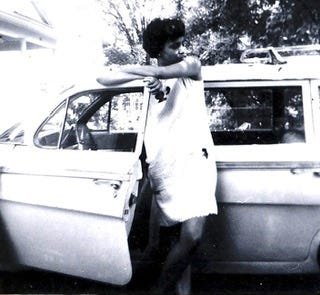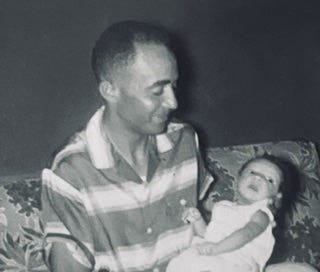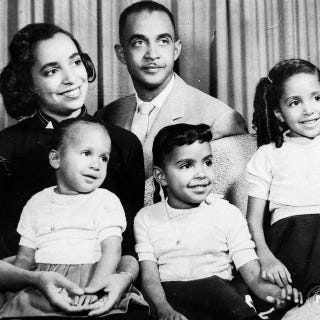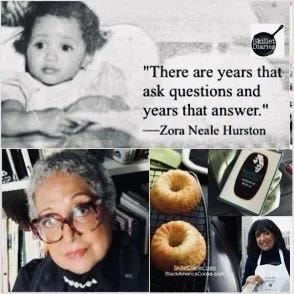Respecting Migrants
The Mexican family seeking work spoke no English. My father whispered a reminder to his children, “We are more alike than we are different” —which still inspires me today.
As California’s dramatic immigration raids leave many families searching for loved ones, this long-ago Missouri memory (I first described in 1996) reminds me to model compassion to our family’s younger generations.
It was a scorching July afternoon in the late 1950s. Since air-conditioned cars were considered an unthinkable luxury, especially for a couple raising four children on teachers’ salaries, windows were rolled down on our aging, white Chevrolet station wagon.

We were driving home on Highway 63 between soybean rows and fields of corn linking Jefferson City, Missouri to Columbia. My brother, still a baby, rode in the front with my parents. My two sisters and I shared the back seat with our dolls.
I was the oldest of the four kids, and today I am the only one, besides my parents, who remembers the Mexican family standing at the side of the road. When we pulled up beside their old car, hazy blasts of steam gushed from the engine.
My dad learned through hand gestures that they were a long way from home, had no money and didn’t speak English. Then, while my dad and the Mexican father worked to cool down the engine, my mother poured Kool-Aid from a thermos and handed paper cups to the other mother and children.
The car didn’t start, so my father drove us home and then returned to help the other family. He drove them to a motel on the Business Loop and paid for the cheapest kitchenette he could find.
For the next two days, while they waited for car repairs, the family came to our home every morning. The father weeded the vegetable garden in our giant backyard. The mother helped Mom in the house. The kids, each finding someone close in age, played together.
At lunchtime, Mom served sandwiches on the picnic table in the shade of twin cherry trees. And each evening, Dad drove the family back to the motel with brown bags filled with tomatoes, beans and other vegetables from our garden.
When a mechanic delivered the repaired car to our house, Dad wrote a check. I remember that both my parents and the Mexican mom and dad had tears in their eyes when they hugged and shook hands goodbye.
The migrant farming family had no idea where the father would find work next.
But I’m sure that he did. Just as I’m sure the oldest son, who was my age that summer before I entered the first grade, shares this memory. And I imagine that he has stopped along stretches of road many times since that day to help stranded motorists.
That summer I learned from observing my parents that friends don’t always speak the same language and that you don’t have to be rich to share.
I learned to notice instead that,
“What we see in others is a mirror of ourselves.”
Above: the three older siblings with Mom and Dad in Columbia, MO, 1950s. Battle Family Archives.
"No one puts their children in a boat unless the water is safer than the land"—Warsan Shire (see sources).
“Give me your tired, your poor, your huddled masses yearning to breathe free”—Emma Lazarus, poet (see sources).
Sources:
Warsan Shire, poet, “Beyoncé contributor,” born 1988 in Kenya to Somali parents, raised in London, currently living in Los Angeles. Click this green link for more information.
Emma Lazarus (1849-1887), poet, The New Colossus displayed on the Statue of Liberty pedestal. Click this green link for more information.









Donna, this is so your parents! Their generosity was one of their beautiful traits. I remember how Gran used to tell stories about the many Military (mostly men, in general, Black men, in particular) who turned up at 554 Cedar avenue or caled 32688 ( our phone) for a quick meal, snacks, hot bath and other creature comforts at th suggestion of Uncle Eliot. During those war and post-war times, it was hard for the Military, Blacks, in particular in the Jim Crow South to negotiate their travels. There was a military base in Mobile, not far from where your Mom grew up and many Black families were a "second family" to them. I recall one couple from Pittsburgh (Chuck and Myrlese) that was stationed in Mobile, the wife stayed with us, Aunt Nee and maybe someone else in the family for a few months. They became very close friends with my parents and had friendship for so many years...they would visit them in Pittsburgh and vice versa for many years. They slways spoke of the generosity they felt extended to them, as strangers, but, felt like family because of the kindness of "strangers". Your parents never departed from those traditions!